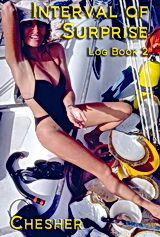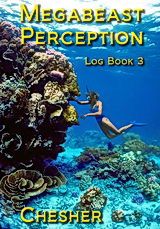DESTINY IN ACTION
We
communicate,
become new patterns of awareness
flowing through a Magic Sea.
Albey Munt told me a story yesterday, just before I left Belasona to come to the hospital.
"When you were in the Trobriands, did you by chance meet Mr. Ryan?" Albey looked unusually serious.
"The man who was just starting to build a small resort there? Sure, we met him. He had been just starting to build the resort for about three years. A big, burly man with a red beard who looked perfectly complacent to be just getting started on the resort for the rest of his life." I replied.
"He had malaria, you know. Rather badly as it turns out. Malaria's not too bad if you treat it promptly, but Mr. Ryan just kept ignoring the symptoms until he really collapsed. Last month they put him on a stretcher and flew him to the hospital in Port Moresby. Unfortunately, he got hepatitis from a poorly sterilized hypodermic needle when they did the blood tests at the hospital and the combination of the Malaria and the hepatitis killed him. He died last week. Do take care, Richard. The hospital in Port Moresby is nearly as deadly as whatever you might have." Albey finished.
I glance around the waiting area. The hospital truly is filthy.
"Dr. Cook will see you now," The nurse cuts off my unpleasant thoughts.
"What seems to be the problem?" Dr. Cook is a tall, lanky, Australian with a competent air about him. I feel better already.
"Well, for about a month now I've been feeling generally rotten and it seems to be getting progressively worse - slowly - some days I feel fine, the next day I'm weak and dizzy. Today, when I walk, I feel like I'm somehow not quite touching the ground. I don't really hurt anywhere except maybe a constant sort of burning sensation in my lower gut. I just feel something is wrong and getting worse. Something bad. I suspect it's a parasite, but we are very careful about what we eat."
Dr. Cook looks tired, too. "Where have you been living, here in Moresby?"
"No, I've been in the Milne Bay area. I'm on a fisheries research project and travel to many of the islands down there."
"I see. There has been quite a bit of leptospirosis down in the Milne Bay area because of the drought." Dr. Cook muses.
"Yes, I know. But as I understand it, you have to come into contact with vegetation or water exposed to animal urine to get it. It can't be the water because, during the drought we have been getting our drinking water from a rain catchment tank. The tank is clean, elevated, covered, and the only reason there is water in it is because someone busted off the valve and the only way to get it is to siphon it out."
He gives me a brief examination, shrugs his shoulders. "Well, nothing obvious, you seem fit enough. We'll check your blood, urine, and stool and see." He scribbles on a note-pad, rips off the sheet and hands it to me. "See the nurse and she'll take you to the laboratory. Come back...uh...Friday, OK? We should be able to get you patched up and back to the islands."
The nurse leads me to a dusty room and sits me down in an old wooden chair. She picks up a glass syringe from an open, dirty wood shelf. The syringe looks well used. There is a blotch of dried blood on the floor at my feet and on the arm of the chair.
"Don't you have any plastic, disposable syringes?" I ask as she fumbles the paper covering off a new needle. At least the needle looks new and sterile.
"We don't have the budget for those, you know. Just have enough to keep the sterilizer working," she flashes me a big grin. I should object. I should get up and run out of here. But while I am thinking about all this she plunges the needle into my arm and sucks out a big red tube of blood. Well, its going out, not in.
I glide back to Peter Wilson's house, half enjoying the floating sensation. He comes driving in just as I arrive, racing up the gravel driveway. His dogs bark and leap around.
"They let you out already?" He pokes his head through the driver's window. "It's all in your head." He grins as he bounces out of the car with a brown bag full of groceries. "Come on, lets fix some lunch."
The house is strangely empty and hollow without Anne and the kids. Peter is, too. We don't talk about it, but I can see it is on his mind all through lunch, all through his banter and jokes. He hurts. After we eat he proposes, in his big American voice, "OK, lets get over to the office and do some work."
I leave him at his cluttered desk and waft over to the fisheries research lab. The director, Barney Smith, is just coming out of a meeting. I like Barney. He's an Australian fisheries biologist who somehow found himself head of the fisheries research station here. He would rather be sailing.
"How's the boat, Barney?" I ask. He bought a copy of the Peterson 44 from Taiwan. Although built from the same plans as the Moira she's a little longer and has a much different personality. We corresponded, Barney and I, back when he was starting the process of getting his boat.
"Well, not bad, not bad," Barney smiles and we shake hands. "Come in and have some coffee. What brings you to the big city?"
"I came to find out what you think of my report," I say.
"Well, actually, I haven't done more than glance at it. You know.... some of the people here hold the survey report doesn't mean much because they don't think your Earthwatchers were, uh, well, experienced enough to be good observers."
"I know. Some of them were not good observers. As I explain in the report I tested them and simply eliminated the data from those divers who were unable to meet the tests. In any case I'm confident the observations and counts made by myself, Freddy, Colin, and many of the other divers are highly accurate."
"I'm sure they are, and I agree with your general conclusions. They don't seem out of line with what I'd expect. But some of the others here don't know you and have only had contact with a few of the Earthwatch people and they are not impressed." For a moment we sit there, Barney in embarrassed silence, me thinking about the fisheries research team we met in Kupiano. They should talk about not being good observers. They couldn't find their asses with both hands.
"I've resigned." He suddenly grins. "My contract is up and I've decided to take the Sabrina and go cruising for a few years."
"Hey, great!" I shake his hand. "We expect to be in Samarai for another couple of months yet, will you be stopping by Belasona to slip?"
"Yes. We intend to. I'd like to talk over some anchorages in the Louisiades and the Solomons with you." He glances at the clock. "Listen, Rick, I think you could probably do some more surveys around here but it's pretty clear you won't get any further support from Fisheries for the Earthwatch groups."
"So I've been told. We've canceled the remaining teams already." I notice one of the glossy pamphlets describing the coastal fisheries station projects on his desk. "I'm not sure they would do any good anyway. I think the government already knows, as you just said, there is not enough product to support those stations. They'll never even break even with their operating costs, let alone make a penny of profit from the investment."
"That's not the idea. Nobody expect them to be profitable. It's a development aid project, to help the people in the provinces get wage earning jobs, promote industry, and improve their standard of living." Barney looks uncomfortable again, as if even he does not believe the standard line.
"If that's the rationale, it's even crazier than I thought. In Tagula, if the fishermen catch a surplus over the basic subsistence needs of the village they sell it to Polisbo's trade store. He freezes the catch. During the long spells of strong southeasterly's the fishermen fish out the accessible areas and can no longer catch enough fish to meet their basic needs. They go to the trade store and buy back the long-frozen catch for just a little more than they got paid for it.
"But the Ice Station in Misima will be exporting what it takes in and when the fishermen need extra protein they'll find it's not in the Ice plant, it's gone, and they will have to buy canned, imported fish to survive. Either that, or the ice plant will charge them an arm and a leg to buy back their own fish and piss them off something fierce. The local fishermen won't be supplying fish to the station very long." Barney shrugs and accepts this without comment.
"National Fisheries, in order to make sure they justify the continued construction of the stations, will send in their own fishing boats with outside fishermen and they will take fish and invertebrates from reefs the local islanders think are theirs. Soon the locals won't be able to find enough fish or invertebrates to meet their basic needs even when the weather is good. In essence, National Fisheries will be reef raping just the same as the illegal Taiwanese boats - stripping the reefs of everything that moves and exporting it. They still won't get enough to break even because the product just isn't there. The reefs just don't have the organic reserve to counter a major commercial thrust." All of this is in the report, but since Barney has not read it, and probably never will, I keep on going.
"In the end, the government of PNG will be PAYING to take fisheries resources away from the people who need them to survive. What kind of thinking is that?" Barney is glancing at the open door - and the clock - and his watch - as I talk.
"Look, Rick, I'm sorry but I've really got to get going." He stands up, so I do too. I realize I've been talking too loud. He's nervous. I'm not even sure what I've been saying and feel very dizzy and disoriented.
Pete is still in his office, head down, buried in his work. "Everyone else has gone home," I instantly regret my words. Pete has no home anymore. "I'm starved. Must be my parasite. Let's go buy some big steaks."
Pete looks like I feel. He closes the file on his desk and puts it on a stack of similar files. As I turn I notice a big blow-up of Moira under sail on his wall. Under the photo is a neatly printed label. It says, "The Research Vessel Moira." Dave Whitcombe took the shot in the Trobriands.



